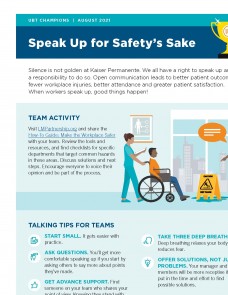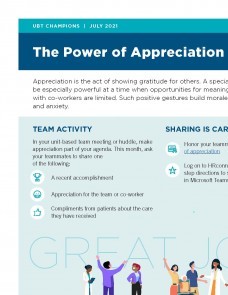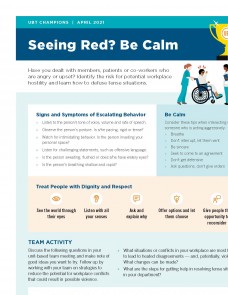TOOLS
TOOLS
TOOLS
TOOLS
TOOLS
Deck
Get tips on the future of workforce learning; view webcast recording for internal use
Even during the COVID-19 pandemic, it's important to make time to learn.
Priscilla Gill and Dawn Nelson of Mayo Clinic emphasized the importance of learning while working during Kaiser Permanente's Future Ready webcast February 25.
"The future of work is about learning," said Gill, director of Workforce Learning. "We all should strive for continuous learning and to be lifelong learners."
"Everyone is some form of a leader," said Nelson, nurse administrator for Education and Professional Development. "Think about how you can grow your personal leadership skills."
Because of the increasing importance of lifelong learning, Labor Management Partnership unions and Kaiser Permanente have negotiated industry-leading resources to assist union members in adapting to change, including tuition reimbursement and education trusts — which had record usage in 2020. Future Ready, hosted by National Workforce Planning and Development, is part of the Workforce of the Future initiative to prepare employees for tomorrow's jobs.
"This is something we've been doing for years and has become even more important with the global pandemic," said Monica Morris, senior director for National Workforce Planning and Development.
3 types of learning
Gill and Nelson agreed, noting the shift this past year to virtual education.
"COVID truly accelerated a lot of our plans," Gill told moderator Peggi Winter, Kaiser Permanente's nurse educaiton leader. "It has indeed moved us at least 5 years into the future."
The webcast, which detailed examples specific to nursing, highlighted learnings that can be applied to many job classifications across Kaiser Permanente.
Mayo Clinic, an integrated health system, emphasizes learning from day one through each career step. This includes learning:
- Experientially on the job
- Socially through learning communities, mentoring and coaching
- Formally with programs, courses, workshops and conferences
"As leaders, we should get to know our staff and understand what their dreams and aspirations are," Gill said. "In doing so, we can help them craft a career plan."
For nurses, learning starts with onboarding, then continues with professional development, a nurse leadership program and nurse leader growth opportunities.
"It is important for staff to be encouraged and guided to find their areas of interest in leadership," Nelson said.
To learn more, view a webcast recording for internal Kaiser Permanente use only.
Hank q1q2-2021
See the whole issueEmpowering the Workforce
Deck
Education and training programs expand opportunities for career growth
The training and education resources negotiated by Kaiser Permanente and the Partnership unions are helping employees advance their careers. These opportunities are making KP’s promise of a diverse and inclusive workplace come to life. Learn more from employees, managers and leaders who shared their stories during the first virtual Workforce Development Week.
Addie Darby, UFCW Local 1996, quality control, Health Information Management, Georgia
With the help of the Ben Hudnall Memorial Trust and encouragement of manager Sophia Wilson, Darby has earned an associate degree in business management, a bachelor's in health administration, and a master's in health technology and education. She’s not stopping there. Darby is enrolled in a doctorate program and plans to graduate this year (2021).
Sadao Nakachi, UNAC/UHCP, emergency room nurse, Southern California
After leveraging workforce development opportunities to become an RN and earn a bachelor’s degree in nursing, Nakachi went on to get a master’s in business for veterans. He holds numerous professional certifications and connects fellow nurses to educational opportunities. “I always try to find courses that’ll overall maximize my potential at KP,” he says. Follow him on Instagram @NurseScholar.
Crystal Muir, OPEIU Local 2, clinical assistant, Mid-Atlantic States
Muir is using tuition reimbursement to pursue her bachelor’s degree in nursing. She’s also used the Ben Hudnall Memorial Trust’s Individual Stipend Program to attend school once a week, which she says, “I've been fortunate to do with trying to balance school, work and life being a mom.” She aims to graduate in 2022.
Sophia Wilson, supervisor, Health Information Management, Georgia
“I encourage all my staff to pursue education to stay marketable and relevant,” Wilson says. “I tell managers, ‘Please do not be so rigid as to make it harder for your employees to soar.’ If you put the resources into your staff, it can be nothing but a win-win.”
Philidah Seda, director, Specialty Care, Georgia
Not only does Seda encourage her staff to use workforce development resources, but she herself is studying for her doctoral degree. “The health care environment is getting more and more complex,” she says. “For us to prepare the workforce of the future, we have to invest in their learning.”
Eula Smith, SEIU-UHW, medical assistant, Northern California
Ask Smith why she wanted to work in health care, and she will bluntly tell you she didn’t. She started at KP as a shuttle bus driver. When that department was outsourced, Smith was offered the opportunity to train as a medical assistant with the help of the SEIU UHW-West & Joint Employer Education Fund. She has overcome her initial reluctance to deal with patients, saying “I love it now.”
Ingris Solares, SEIU Local 105, medical lab technician, Colorado
Solares began her career at KP as a phlebotomist before getting trained in her current field in an apprenticeship program with the help of SEIU Local 105 and the SEIU UHW-West & Joint Employer Education Fund. She intends to get more education to become a clinical lab scientist. “I knew I wanted more because I'm the first generation here in the United States,” she says. “My parents came from Guatemala, so I always felt like I needed to make the trip here worth it.”
Michael Brown, senior vice president, HR Consulting, National Functions
Before embarking on a career path that would bring him to KP as an HR leader, Brown went to law school. His father was frank with him: As a Black man, he needed an advanced degree to position himself for the same opportunities that others had.
“Before I even started working, I knew that education was going to be the equalizer.” That’s why he encourages KP employees to use workforce development programs and cultivate learning agility by trying different shifts, joining different departments and seeking informal leadership roles.
Kerrin Watkins, manager, Dental Office, Northwest
It's hard to lose top performers, but amazing to see them grow. “Invest in your employees and let them know you want to see them succeed,” Watkins says. “This will benefit you in the long run, because you will have employees that will feel more valued. If you take care of your employees, your employees will take care of your business.”
Videos
()
Watch this short video to hear what LMP team members in KP Washington have to say about the benefits of Partnership for frontline workers, managers, and physicians.







